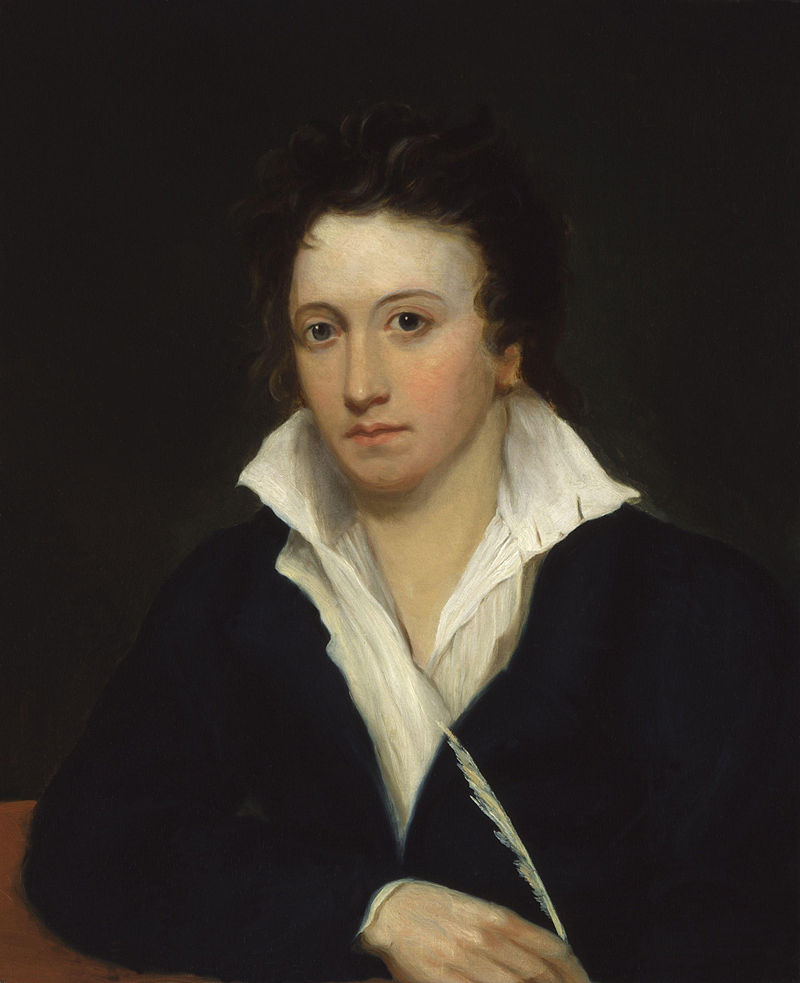Percy Bysshe Shelley

Percy Bysshe Shelley (4 August 1792 – 8 July 1822) was one of the major English Romantic poets, who is regarded by some as among the finer lyric and philosophical poets in the English language, and one of the more influential. A radical in his poetry as well as in his political and social views, Shelley did not see fame during his lifetime, but recognition of his achievements in poetry grew steadily following his death. Shelley was a key member of a close circle of visionary poets and writers that included Lord Byron, Leigh Hunt, Thomas Love Peacock, and his own second wife, Mary Shelley, the author of Frankenstein.
Shelley is perhaps best known for classic poems such as “Ozymandias”, “Ode to the West Wind”, “To a Skylark”, “Music, When Soft Voices Die”, “The Cloud”, and “The Masque of Anarchy”. His other major works include a groundbreaking verse drama The Cenci (1819) and long, visionary, philosophical poems such as Queen Mab (later reworked as The Daemon of the World), Alastor, The Revolt of Islam, Adonaïs, Prometheus Unbound (1820)—widely considered to be his masterpiece—Hellas: A Lyrical Drama (1821), and his final, unfinished work, The Triumph of Life(1822).
Shelley’s close circle of friends included some of the more important progressive thinkers of the day, including his father-in-law, the philosopher William Godwin, and Leigh Hunt. Though Shelley’s poetry and prose output remained steady throughout his life, most publishers and journals declined to publish his work for fear of being arrested for either blasphemy or sedition. Shelley’s poetry sometimes had only an underground readership during his day, but his poetic achievements are widely recognized today, and his political and social thought had an impact on the Chartist and other movements in England, and reach down to the present day. Shelley’s theories of economics and morality, for example, had a profound influence on Karl Marx; his early—perhaps first—writings on nonviolent resistance influenced Leo Tolstoy, whose writings on the subject in turn influenced Mahatma Gandhi, and through him Martin Luther King Jr. and others practicing nonviolence during the American civil rights movement.
Shelley became a lodestone to the subsequent three or four generations of poets, including important Victorian and Pre-Raphaelite poets such as Robert Browning and Dante Gabriel Rossetti. He was admired by Oscar Wilde, Thomas Hardy, George Bernard Shaw, Leo Tolstoy, Bertrand Russell, W. B. Yeats, Upton Sinclair and Isadora Duncan.[ Henry David Thoreau’s Civil Disobedience was apparently influenced by Shelley’s writings and theories on non-violence in protest and political action. Shelley’s popularity and influence has continued to grow in contemporary poetry circles.
Major works
- (1810) Zastrozzi
- (1810) Original Poetry by Victor and Cazire
- (1810) Posthumous Fragments of Margaret Nicholson: Being Poems Found Amongst the Papers of That Noted Female Who Attempted the Life of the King in 1786
- (1810 dated 1811) St. Irvyne; or, The Rosicrucian
- (1812) The Devil’s Walk: A Ballad
- (1813) Queen Mab: A Philosophical Poem
- (1814) A Refutation of Deism: In a Dialogue
- (1815) Alastor, or The Spirit of Solitude
- (1816) The Daemon of the World
- (1816) Mont Blanc
- (1816) On Death
- (1817) Hymn to Intellectual Beauty
- (1817) Laon and Cythna; or, The Revolution of the Golden City: A Vision of the Nineteenth Century
- (1817) The Revolt of Islam, A Poem, in Twelve Cantos
- (1817) History of a Six Weeks’ Tour through a part of France, Switzerland, Germany, and Holland (with Mary Shelley)
- (1818) Ozymandias
- (1818) The Banquet (or The Symposium) by Plato, translation from Greek into English[
- (1818) Rosalind and Helen: A Modern Eclogue (published in 1819)
- (1818) Lines Written Among the Euganean Hills, October 1818
- (1819) The Cenci, A Tragedy, in Five Acts
- (1819) Ode to the West Wind
- (1819) The Masque of Anarchy
- (1819) England in 1819
- (1819) A Philosophical View of Reform (published in 1920)
- (1819) Julian and Maddalo: A Conversation
- (1820) Peter Bell the Third (published in 1839)
- (1820) Prometheus Unbound, A Lyrical Drama, in Four Acts
- (1820) To a Skylark
- (1820) The Cloud
- (1820) The Sensitive Plant[
- (1820) Oedipus Tyrannus; Or, Swellfoot The Tyrant: A Tragedy in Two Acts
- (1820) The Witch of Atlas (published in 1824)
- (1821) Adonaïs
- (1821) Ion by Plato, translation from Greek into English
- (1821) A Defence of Poetry (first published in 1840)
- (1821) Epipsychidion
- (1822) Hellas, A Lyrical Drama
- (1822) Wolfstein; or, The Mysterious Bandit
- (1822) The Triumph of Life (unfinished, published in 1824)
Short prose works
- “The Assassins, A Fragment of a Romance” (1814)
- “The Coliseum, A Fragment” (1817)
- “The Elysian Fields: A Lucianic Fragment” (1818)
- “Una Favola (A Fable)” (1819, originally in Italian)
Essays
- The Necessity of Atheism (1811)
- Poetical Essay on the Existing State of Things (1811)
- Declaration of Rights (1812)
- A Letter to Lord Ellenborough (1812)
- A Defence of Poetry
- A Vindication of Natural Diet (1813)
- A Refutation of Deism (1814)
- On the Vegetable System of Diet (1814–1815; published 1929)
- On Love (1818)
- On Life (1819)
- On a Future State (1815)
- On The Punishment of Death
- Speculations on Metaphysics (1814)
- Speculations on Morals (1817)
- On Christianity (incomplete, probably 1817; published 1859)
- On the Literature, the Arts and the Manners of the Athenians
- On The Symposium, or Preface to The Banquet Of Plato
- On Friendship
- On Frankenstein (written in 1817; published in 1832)
Chapbooks
- Wolfstein; or, The Mysterious Bandit (1822)
- Wolfstein, The Murderer; or, The Secrets of a Robber’s Cave (1830)
Collaborations with Mary Shelley
- (1817) History of a Six Weeks’ Tour
- (1818) Frankenstein; or, The Modern Prometheus[
- (1820) Proserpine
- (1820) Midas
